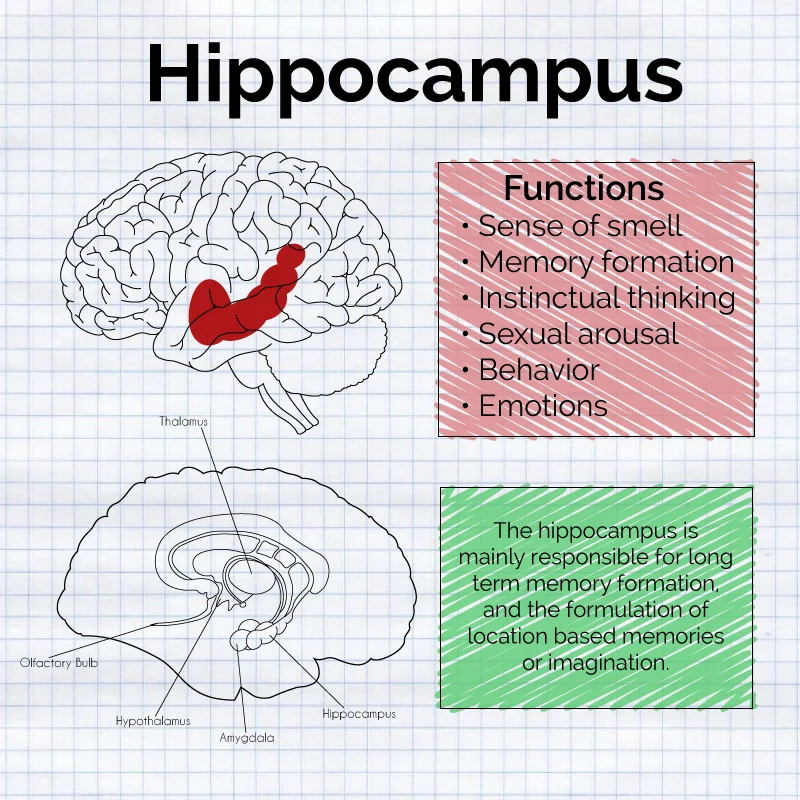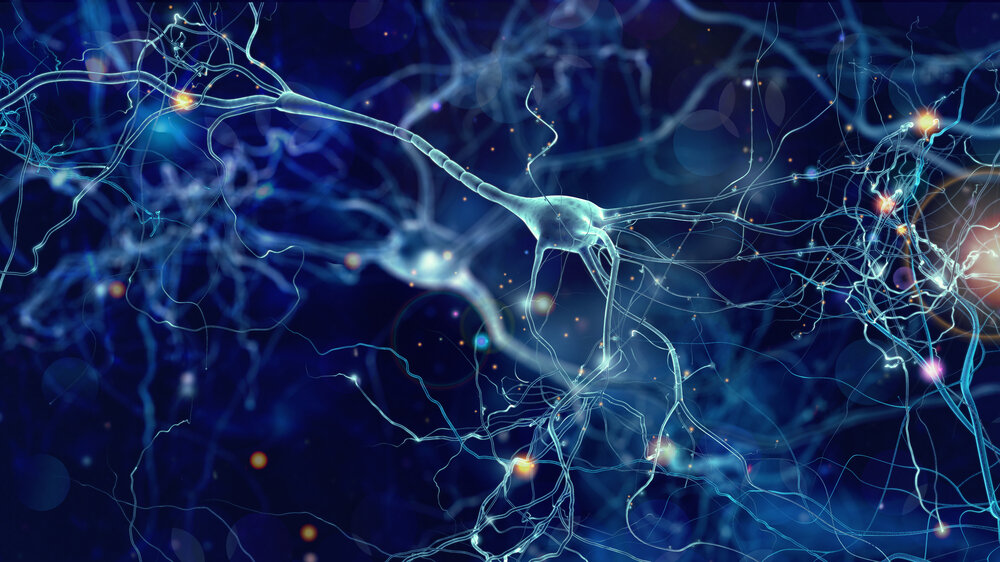Our brains can be separated into several major compartments, each with their own specialties.
Some, like the hippocampus, have highly specialized roles, like memory, or our ability to anticipate and imagine events before they ever occur.
The brain is like an office, there’s an accountant, marketing team, CEO, and secretary.
All with their own roles and responsibilities, but working together to conduct the functions of the office as a whole.
The hippocampus is a particularly interesting region of the brain because it's so heavily involved with storing past event memories.
It’s like the photo album of the brain, where old memories are kept and stored, only to be dusted off and looked at later on.
The hippocampus can have the opposite effect as well.
That is, to imagine future events that have not happened.
This is a crucially important ability for human beings to possess, and is what allows us to make intelligent decisions, and line up milestones towards a particular goal.
This can be as simple as catching an animal for dinner by waiting by its den, or as complex as strategizing retirement funding, or planning a career path.
In effect, the hippocampus is a sort of mental “time-travel” organ that can bring us forward or backward in time whenever it suits us.
Where Is The Hippocampus?
The hippocampus forms part of the limbic system of the brain (known commonly as the primal brain).
This is because it's existed long before a lot of the higher brain structures ever formed.
This is the area where many of the basic brain functions are conducted.
The limbic system processes our sense of smell, memory formation, instinctual thinking, sexual arousal, behaviour, and emotions.
There are actually 2 organs on each side of the brain that form the hippocampus.
It got its name from of its resemblance to a seahorse. Hippo means horse in Latin, and Kampos means sea monster. The hippocampus actually does resemble the shape of a seahorse quite well!
Sea the resemblance?
The Hippocampus & Memory
The hippocampus is well known to play a role in storing past event memories, and allows us to visualize places and events that have happened in the past.
This has been proven by analyzing the brains of rats, and through the pathological process of hippocampal damage.
In many cases, when damage to the hippocampus occurs, people will only be able to recall events that took place before the damage occurred. They will be unable to store new memories as well.
The hippocampus has only recently been shown to influence future events.
Researchers at the Boston University School of Medicine (BUSM) recently determined the role of the hippocampus in terms of imagining the future. The team used Functional Magnetic Resonance Imaging (FMRI) to scan the brains of healthy adults while they imagined past and future events.
They did this through a set of questions involving both past and future scenarios, and then compared the scans at the end. They also included comparisons of the questions that involved imagining a scene, and those that did not.
The results showed that although the hippocampus was involved in both the past, and future imagination, the questions involving the formation of a "scene" or location were much stronger than those without.
This suggests the hippocampus is closely tied with the brain's ability to formulate an image of a place we have seen in the past, or places we can only imagine.
The most significant finding in this study actually has to do with how the memories are stored. It appears the hippocampus is best at retrieving or storing these memories in the form of a visual location.
In all the questions asked, the highest activity level was noted on questions that required the participants to visualize the location in their mind, both past and future.
It was concluded that the hippocampus is an important part of the brain for creating visual memories, and may have more deeply rooted connections to the process of memory formation than previously thought.
Alzheimer's Disease & The Hippocampus
In conditions like Alzheimer's, the hippocampus is usually the first place to show signs of damage. This makes sense when you consider the importance for this brain structure on the formation of memories.
It’s located in the center of the brain, and plays an important role in nearly all forms of memory retrieval and formation. In a sense, it gets a lot of wear and tear and is highly susceptible to hypoxia and oxidative or free radical damage.
The first signs of Alzheimer's are directly related to hippocampal damage like disorientation, reduced spacial awareness, and a decreased ability to form new memories like where those damn keys are, or what that guy at the liquor store’s name was.
Tips For Supporting a Healthy Hippocampus
1. Avoid Stress
The hippocampus contains a high amount of glucocorticoid receptors. This is the receptor that the stress hormone cortisol binds to. With repeated exposure to stress, much of the hippocampus will become sensitized, and will become less effective.
This means it will be harder to store memories, retrieve memories, and form location based thoughts and visualizations. The hippocampus is susceptible to damage from long term states of stress as well, and can lead to all sorts of cognitive dysfunctions.
Try meditating once a day. This can be as simple as sitting down with a cup of tea or coffee, and just drinking it. Don’t look at your phone, or concentrate on any of the things you need to do. This is a simple form of meditation that anybody can do. It should be at least 15 minutes long.
Of course other forms of meditation are also highly effective for reducing stress in your life and can range anywhere from ritualistic meditation practices like buddhism, to simply sitting in a quiet spot for a few minutes. It can also be something like painting, drawing, or sculpting. Virtually anything where you can stay quiet and undistracted for a few moments will do the trick.
Making simple changes to your life can also go a long way in reducing stress. Streamlining tedious and annoying tasks through apps or program for example, is one of the easiest ways to reduce stress by adding some automation to your life.
I highly recommend using something like IFTTT to automate your life.
2. Antioxidants
A lot of the posts at The Sunlight Experiment talk about the importance of antioxidants in your life. And it's definitely a topic that's been advertised to exhaustion by juice and Açai bars recently, it really isn't something to be overlooked.
They are by no means a cure-all, but are very useful for minimizing oxidative and free radical damage in the brain, and the rest of the body.
As we have discussed, the hippocampus is highly prone to oxidative damage. This can be prevented or in the very least reduced, by consuming high levels of antioxidants on a regular basis.
I highly recommend daily doses of yerba maté tea, coffee, or cacao beans as a source of potent antioxidants to protect the hippocampus.
A Special Side Note For Optimizing Memory Storage:
Try Using Memory visualization Techniques
Now that we understand that the hippocampus plays a key role in the construction of visual memories and locations, we can use this information to improve how we use our memory.
This involves memory techniques to store new information more effectively.
The main technique that is completely relevant to the hippocampus is through memory visualization techniques.
There has been a lot of development in this area by people like Phil Chambers from The Magnetic Memory Method.
Phil, and many others have been researching various ways we can store memories more efficiently using visual techniques like mind mapping and memory palaces. This is an important tool for storing memories effectively because it uses the natural, location based preferences of the hippocampus for storing these memories.
Recent Blog Posts
References:
Boston University Medical Center (2016, December 5). How the Hippocampus Influences Future Thinking. Neuroscience New. Retrieved December 5, 2016 from http://neurosciencenews.com/future-thinking-hippocampus-5680/
Joëls M (Apr 2008). "Functional actions of corticosteroids in the hippocampus". European Journal of Pharmacology. 583 (2-3): 312–321. doi:10.1016/j.ejphar.2007.11.064
Neuroscience News. (2016). How the Hippocampus Influences Future Thinking – Neuroscience News. Retrieved from http://neurosciencenews.com/future-thinking-hippocampus-5680/













